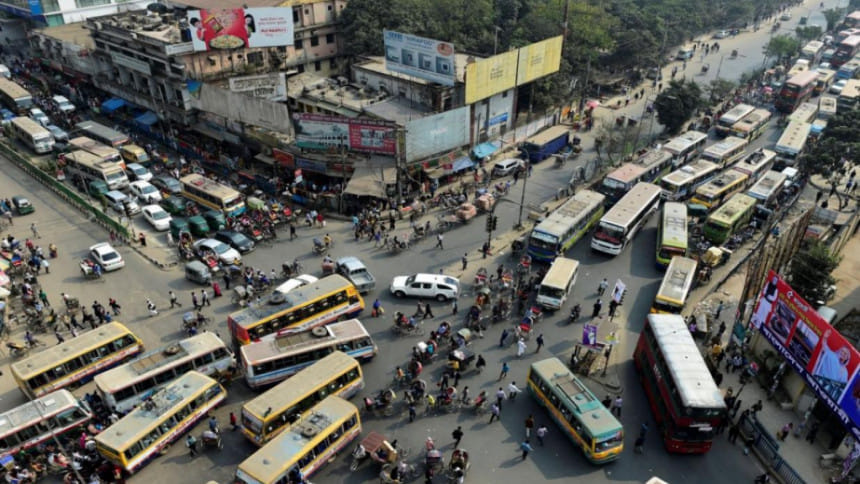Some solutions to Dhaka’s traffic problem

So much has been said about how the traffic situation in Dhaka could be improved, but little has been achieved in that regard. To have safe and jam free roads, you need to have a sound urban transport system and an integrated strategy. Those are things we don't have.
An analysis of future urban transport needs, assessing existing accessibility levels with the expected trends of urban sprawl, concluded that just maintaining accessibility level would require road investments that are not financially or environmentally sustainable. So, our transport sector may not develop as required to meet the needs; but some innovative measures can improve the situation.
Traffic weeks
Traffic weeks should be continued for six months as observed by Dhaka Metropolitan Police. The services to be provided are: i) Creating awareness, civic sense and consciousness about traffic laws and traffic safety. This should target all the vehicle owners, drivers and pedestrians; ii) Assist disabled, blind, elderly people, children and pregnant women to cross the roads, ensure that the pedestrians use the foot overbridges wherever available; iii) Ensure that the vehicles do not stop on/over the zebra crossings; iv) Brief rickshaw-pullers about the benefits of driving in single lines and parking in columns and rows, as may be applicable; and v) free footpaths and foot overbridges from hawkers.
During the initial weeks, the traffic police should give verbal warnings to the drivers for eventual punishment in case of violation of traffic rules during the fourth and fifth months. In the sixth month, there should be no compromise—driving licenses and fitness certificates should be confiscated from traffic rule violators.
Uniform holidays
It is a blessing for Dhaka-dwellers that area wise shopping centres/malls, markets remain close on certain days in a week. In line with this, all the schools, colleges and universities should ideally remain closed during those days. The concerned authorities should be able to decide on this. Even doctors' consultation chambers should follow the same weekly holiday. In addition, all schools and colleges should take the initiative to introduce bus services for their students. This would be a great relief for the parents.
We have 366 bus routes having 6,167 buses and 2,805 mini buses (approved). Twenty percent of these could also remain off the roads on the day that shopping centres, malls and markets are closed. Bus owners could have the option to decide for themselves which buses and minibuses to keep off the road by rotation per week.
Speed reducing equipment is available and cost about Tk 4,000-6,000 each. All the buses and minibuses should be installed with this equipment, thereby limiting their speed. Dhaka North City Corporation, Dhaka South City Corporation, Dhaka Transport Coordination Authority, Bangladesh Road Transport Corporation and Bangladesh Road Transport Authority may be requested to come up with the fund and share the cost among themselves.
Circular bus routes are in practice in Banani and Gulshan areas. Similar bus services could easily be introduced in Gulistan, Motijheel, Mohakhali, Mirpur and or other places. These short duration circular services would reduce travel time and play a significant role in reducing traffic.
Unauthorised and/or illegal parking
We have seen the Dhaka Metropolitan Police initiating some steps to combat illegal parking by introducing wheel-locks. They need to continue with this and on a larger scale. This would discourage drivers and or owners from repeating the same offence and would also be a lesson for others to not commit similar violations.
Separate office timings could be introduced for all private firms/offices located in DNCC and DSCC. This will reduce traffic jams significantly.
The residential areas of Dhanmondi, Gulshan, Banani and Uttara have a number of internal roads/lanes. Based on the local traffic flow/conditions, some of these could be designated for parking during peak hours, thereby reducing roadside parking and at the same time lead to revenue for DNCC and DSCC.
All these measures could be implemented within six to 12 months and would significantly decongest the busy roads.
Introducing double decker buses
Bangladesh Road Transport Corporation signed a contract with Ashok Leyland, India, in August 2018. Under the agreement, India is to procure 300 double-deckers for Bangladesh within eight months. We do not know how many have been delivered. As a second option, these could be assembled in Bangladesh. There are about six to eight well established bus assembly plants in Bangladesh who could assemble double decker buses. All they need is to train up some engineers and technicians to improve their capabilities. Even if six companies are given the license to assemble, we would have 288 double decker buses in two years.
Enforcing the Road Transport Act, 2018
This was passed more than a year ago and surprisingly as the media reports, could not be implemented due to strong resistance by the transport owners and drivers' associations who opposed some of the provisions in the law. Strikes have been called but the government should deal with this situation firmly and decisively.
Neighbourhood schooling (area wise)
This is in practice in many countries around the world. Neighbourhood schools are the schools assigned to all nearby children of a certain grade level. Higher-grade students need to travel a little farther, implying that the higher their grade, the farther away their school/colleges are. The Ministry of Education, which is the apex policymaking institution of the government concerning education, needs to change its mindset about introducing this.
Gazi A Rahmani is Senior Advisor, Euro Consultant Mott MacDonald, Dhaka.

 For all latest news, follow The Daily Star's Google News channel.
For all latest news, follow The Daily Star's Google News channel. 



Comments